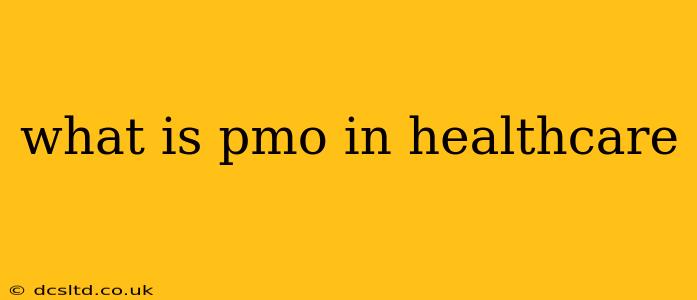In the dynamic world of healthcare, where efficiency, regulatory compliance, and patient care are paramount, the Project Management Office (PMO) plays a crucial role. But what exactly is a PMO in healthcare? It's more than just a department; it's a strategic function that drives successful project delivery and organizational alignment. This article dives deep into the world of healthcare PMOs, answering common questions and highlighting their vital contributions.
What are the functions of a PMO in healthcare?
A healthcare PMO's functions are multifaceted and directly contribute to the overall success of the organization. Their core responsibilities generally include:
- Standardizing Project Management Methodologies: PMOs establish consistent processes, templates, and best practices for managing projects across the entire healthcare system. This ensures uniformity and predictability in project outcomes.
- Providing Project Management Support: They offer guidance, training, and resources to project managers and teams, ensuring projects are executed efficiently and effectively. This often includes access to specialized tools and templates.
- Centralized Project Portfolio Management: PMOs manage and prioritize the organization's project portfolio, ensuring alignment with strategic goals and resource optimization. This includes evaluating project proposals and allocating resources effectively.
- Risk Management & Mitigation: They identify potential risks associated with projects, develop mitigation strategies, and proactively address challenges to prevent project failures. This is especially crucial in healthcare, where patient safety is paramount.
- Tracking Progress & Reporting: PMOs monitor project progress against timelines and budgets, providing regular reports to stakeholders. This transparency ensures accountability and facilitates timely interventions when necessary.
- Improving Operational Efficiency: By streamlining processes and improving project management, PMOs contribute to greater operational efficiency throughout the organization. This can lead to cost savings and improved patient outcomes.
What is the role of a PMO in hospital management?
Within hospital management, the PMO plays a vital role in overseeing projects related to:
- Technology Implementation: Implementing new Electronic Health Record (EHR) systems, upgrading medical equipment, or integrating new telehealth technologies are complex projects requiring strong PMO support.
- Construction and Renovation: Managing construction and renovation projects, from building new wings to renovating existing facilities, necessitates meticulous planning and execution—a key PMO responsibility.
- Compliance and Regulatory Changes: Adapting to changing regulations and ensuring compliance with industry standards often involves significant projects that require careful management. The PMO guides these initiatives.
- Process Improvement Initiatives: Implementing Lean methodologies or Six Sigma principles to improve operational efficiency relies heavily on the PMO's project management expertise.
What are the benefits of having a PMO in healthcare?
The benefits of a well-functioning PMO in healthcare are significant and far-reaching:
- Improved Project Success Rates: By providing standardized methodologies and support, PMOs significantly increase the likelihood of projects being completed on time and within budget.
- Enhanced Resource Allocation: Effective portfolio management leads to better resource allocation, minimizing waste and maximizing the impact of investments.
- Reduced Risks and Costs: Proactive risk management minimizes potential problems, reducing overall project costs and avoiding costly delays.
- Increased Transparency and Accountability: Regular reporting and progress tracking ensure transparency and accountability, fostering trust among stakeholders.
- Better Compliance: PMOs help organizations navigate complex regulatory landscapes and ensure compliance with industry standards.
How does a PMO contribute to better patient care?
While not directly involved in patient interaction, the PMO indirectly contributes to better patient care through:
- Improved efficiency in healthcare operations: Streamlined processes and reduced project delays mean better resource allocation for patient care.
- Enhanced technology implementation: Successful implementation of EHR systems and other technologies improves the quality and efficiency of patient care.
- Facilitating timely access to treatment: Efficient project management can expedite the implementation of new treatments and services.
In conclusion, the PMO is an integral part of the modern healthcare organization. Its contributions extend far beyond project management, driving strategic alignment, fostering efficiency, and ultimately contributing to improved patient care and organizational success. The benefits far outweigh the investment, making it a crucial component of a thriving healthcare system.
